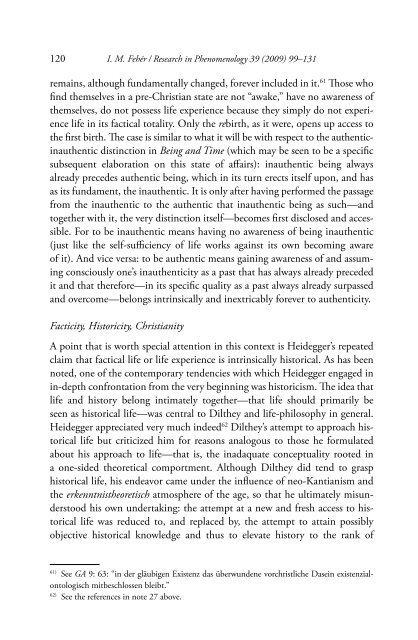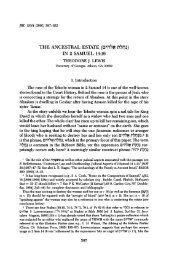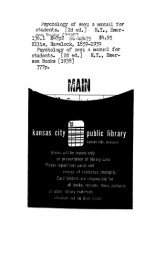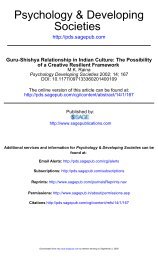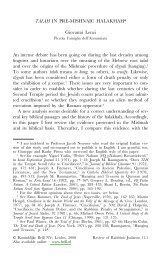Religion, Theology, and Philosophy on the Way to Being and Time ...
Religion, Theology, and Philosophy on the Way to Being and Time ...
Religion, Theology, and Philosophy on the Way to Being and Time ...
You also want an ePaper? Increase the reach of your titles
YUMPU automatically turns print PDFs into web optimized ePapers that Google loves.
120 I. M. Fehér / Research in Phenomenology 39 (2009) 99–131<br />
remains, although fundamentally changed, forever included in it. 61 Th ose who<br />
fi nd <strong>the</strong>mselves in a pre-Christian state are not “awake,” have no awareness of<br />
<strong>the</strong>mselves, do not possess life experience because <strong>the</strong>y simply do not experience<br />
life in its factical <strong>to</strong>tality. Only <strong>the</strong> rebirth, as it were, opens up access <strong>to</strong><br />
<strong>the</strong> fi rst birth. Th e case is similar <strong>to</strong> what it will be with respect <strong>to</strong> <strong>the</strong> au<strong>the</strong>nticinau<strong>the</strong>ntic<br />
distincti<strong>on</strong> in <strong>Being</strong> <str<strong>on</strong>g>and</str<strong>on</strong>g> <strong>Time</strong> (which may be seen <strong>to</strong> be a specifi c<br />
subsequent elaborati<strong>on</strong> <strong>on</strong> this state of aff airs): inau<strong>the</strong>ntic being always<br />
already precedes au<strong>the</strong>ntic being, which in its turn erects itself up<strong>on</strong>, <str<strong>on</strong>g>and</str<strong>on</strong>g> has<br />
as its fundament, <strong>the</strong> inau<strong>the</strong>ntic. It is <strong>on</strong>ly after having performed <strong>the</strong> passage<br />
from <strong>the</strong> inau<strong>the</strong>ntic <strong>to</strong> <strong>the</strong> au<strong>the</strong>ntic that inau<strong>the</strong>ntic being as such—<str<strong>on</strong>g>and</str<strong>on</strong>g><br />
<strong>to</strong>ge<strong>the</strong>r with it, <strong>the</strong> very distincti<strong>on</strong> itself—becomes fi rst disclosed <str<strong>on</strong>g>and</str<strong>on</strong>g> accessible.<br />
For <strong>to</strong> be inau<strong>the</strong>ntic means having no awareness of being inau<strong>the</strong>ntic<br />
(just like <strong>the</strong> self-suffi ciency of life works against its own becoming aware<br />
of it). And vice versa: <strong>to</strong> be au<strong>the</strong>ntic means gaining awareness of <str<strong>on</strong>g>and</str<strong>on</strong>g> assuming<br />
c<strong>on</strong>sciously <strong>on</strong>e’s inau<strong>the</strong>nticity as a past that has always already preceded<br />
it <str<strong>on</strong>g>and</str<strong>on</strong>g> that <strong>the</strong>refore—in its specifi c quality as a past always already surpassed<br />
<str<strong>on</strong>g>and</str<strong>on</strong>g> overcome—bel<strong>on</strong>gs intrinsically <str<strong>on</strong>g>and</str<strong>on</strong>g> inextricably forever <strong>to</strong> au<strong>the</strong>nticity.<br />
Facticity, His<strong>to</strong>ricity, Christianity<br />
A point that is worth special attenti<strong>on</strong> in this c<strong>on</strong>text is Heidegger’s repeated<br />
claim that factical life or life experience is intrinsically his<strong>to</strong>rical. As has been<br />
noted, <strong>on</strong>e of <strong>the</strong> c<strong>on</strong>temporary tendencies with which Heidegger engaged in<br />
in-depth c<strong>on</strong>fr<strong>on</strong>tati<strong>on</strong> from <strong>the</strong> very beginning was his<strong>to</strong>ricism. Th e idea that<br />
life <str<strong>on</strong>g>and</str<strong>on</strong>g> his<strong>to</strong>ry bel<strong>on</strong>g intimately <strong>to</strong>ge<strong>the</strong>r—that life should primarily be<br />
seen as his<strong>to</strong>rical life—was central <strong>to</strong> Dil<strong>the</strong>y <str<strong>on</strong>g>and</str<strong>on</strong>g> life-philosophy in general.<br />
Heidegger appreciated very much indeed 62 Dil<strong>the</strong>y’s attempt <strong>to</strong> approach his<strong>to</strong>rical<br />
life but criticized him for reas<strong>on</strong>s analogous <strong>to</strong> those he formulated<br />
about his approach <strong>to</strong> life—that is, <strong>the</strong> inadaquate c<strong>on</strong>ceptuality rooted in<br />
a <strong>on</strong>e-sided <strong>the</strong>oretical comportment. Although Dil<strong>the</strong>y did tend <strong>to</strong> grasp<br />
his<strong>to</strong>rical life, his endeavor came under <strong>the</strong> infl uence of neo-Kantianism <str<strong>on</strong>g>and</str<strong>on</strong>g><br />
<strong>the</strong> erkenntnis<strong>the</strong>oretisch atmosphere of <strong>the</strong> age, so that he ultimately misunders<strong>to</strong>od<br />
his own undertaking: <strong>the</strong> attempt at a new <str<strong>on</strong>g>and</str<strong>on</strong>g> fresh access <strong>to</strong> his<strong>to</strong>rical<br />
life was reduced <strong>to</strong>, <str<strong>on</strong>g>and</str<strong>on</strong>g> replaced by, <strong>the</strong> attempt <strong>to</strong> attain possibly<br />
objective his<strong>to</strong>rical knowledge <str<strong>on</strong>g>and</str<strong>on</strong>g> thus <strong>to</strong> elevate his<strong>to</strong>ry <strong>to</strong> <strong>the</strong> rank of<br />
61) See GA 9: 63: “in der gläubigen Existenz das überwundene vorchristliche Dasein existenzial<strong>on</strong><strong>to</strong>logisch<br />
mitbeschlossen bleibt.”<br />
62) See <strong>the</strong> references in note 27 above.


